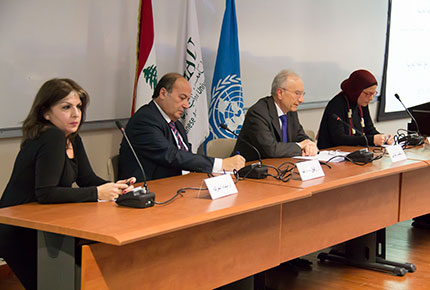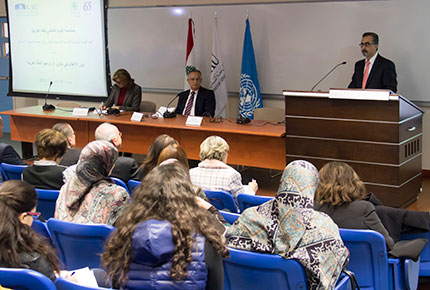Saving Arabic
Experts gather at LAU to discuss the impact of the media on Arabic.

The speakers at the event. From left, Dr. Sanaa Haraka, Rafik Nasrallah, Dr. Latif Zeitouneh and Dr. Yasmine Dabbous.
On the occasion of the UN Arabic Language Day, annually observed on December 18, the School of Arts and Sciences hosted a seminar on the impact of the media on the Arabic language. The event was organized in collaboration with the Lebanese National Commission for UNESCO (LNCU).
“One cannot deny that the media have had a great role in modernizing the Arabic language, however there are major loopholes with wrong words being used often, incorrect pronunciation and last but not least major grammatical errors,” said Dr. Zahida Darwish Jabbour, secretary general of the LNCU.
While experts agreed that the quality of the written language used in the press remains intact, they also settled on the idea that audio-visual and social media are delivering the coup de grace.
“The problem is that there is a major weakness in our education programs and curricula when it comes to Arabic, including in journalism,” said Andre Qassas, who spoke on the behalf of Information Minister Waleed Daouk. This was compounded by journalist Rafik Nasrallah’s observation that most journalists who work for Arabic-speaking channels lack a proper knowledge of Arabic and that only 8% of all the Arabic-speaking channels have kept a good level of Arabic in news broadcasts.
The experts collectively rejected the idea that Arabic - a language that has been historically associated with technologies and the sciences - could not adapt to and adopt the world of new technologies. “This discussion about modernizing Arabic started over a century ago, and the fact that we are holding this seminar today is a proof of failure,” said Dr. Latif Zeitouni, professor of Arabic literature in LAU’s Department of Humanities, who moderated the event.
According to Dr. Darwish Jabbour, several initiatives have been taken in different corners of the region - all focused on the modernization and the expansion of the lexicon with the aim to adapt it to modern scientific and technical needs. “The problem is that nothing has ever been made public, there is no coordination between the different entities in charge. This has led to a lot of energy and money going to waste,” she added.
However, palliating difficulties some might find, the young generation has come up with a parody, using ‘Arabizi’ to communicate through social media. Wikipedia describes ‘Arabizi’ as a character encoding of Arabic to the Latin script and the Arabic numerals. Dr. Yasmine Dabbous, assistant professor of journalism and media studies, presented some research she has been conducting about the subject. “The danger is that although it was initially restricted to informal settings of communication like chats and text messages… we are now finding students taking their notes in Arabizi,” she declared.
For Sanaa Haraka, professor of Arabic at the Lebanese University, a language lives and dies, and for it not to die we have to live and love it. “We should not put more blame on the media than necessary. In my opinion the problem is much broader and starts at school with the texts and the books whose texts and illustrations remain often very far from what our children identify with,” she said asking, “Is it a mere language crisis or a whole nation’s identity crisis?” A question raised in a way or another by every speaker at the event.
More
Latest Stories
- Into the Psychology of Justice
- Alumnus Zak Kassas on Navigation, Spoofing and the Future of GPS
- Hearing Between the Lines
- LAU Hematology Conference 2025: Advancing Science Through Interdisciplinary Exchange
- Dr. Chaouki T. Abdallah Invested as LAU’s 10th President
- LAU Guides Its Students Through the Code of Conduct
- Innovative Procedure at LAU Medical Center–Rizk Hospital Signals Hope for a Patient With a Congenital Disease
- LAU’s Inaugural PodChat Session Addresses AI Detection in the Classroom


